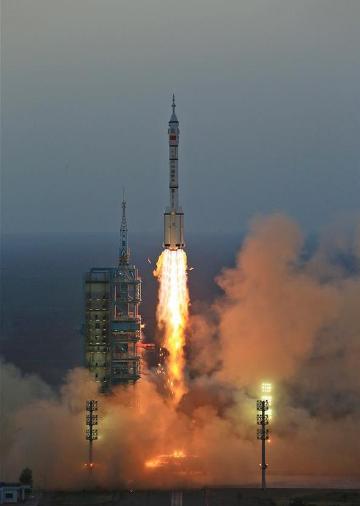China’s Shenzhou-11 manned spacecraft blasts off
The Long March-2F carrier rocket carrying China’s Shenzhou-11 manned spacecraft blasts off from the launch pad at the Jiuquan Satellite Launch Center in Jiuquan, northwest China’s Gansu Province, Oct. 17, 2016. (Xinhua/Li Gang)
China has launched two men into orbit in a project designed to develop its ability to explore space.
The astronauts took off from the Jiuquan Satellite Launch Centre in northern China.
They will dock with the experimental Tiangong 2 space lab and spend 30 days there, the longest stay in space by Chinese astronauts.
This and previous launches are seen as pointers to possible crewed missions to the Moon or Mars.
An earlier Tiangong – or Heavenly Palace – space station was decommissioned earlier this year after docking with three rockets.
The astronauts on this latest mission were Jing Haipeng, 49, who has already been to space twice, and 37-year-old Chen Dong.\
From a remote launching station in Inner Mongolia I’m watching as a rocket tears through the sky. It will take the astronauts about two days to reach the orbiting laboratory where they will live for a month.
While on board the pair will carry out experiments including an examination of plant growth in space. They’ll also use ultrasound equipment to test their own bodies.
This mission is a source of considerable national pride here. So much so that even the foreign media has been allowed into this military base to view the launch.
The astronauts will spend the next month conducting experiments on the Tiangong 2.
China plans to expand the lab over the next few years by sending up additional modules. It is expected to be fully operational by 2022.
In a congratulatory statement to the astronauts carried by state media, President Xi Jinping said he hoped they “vigorously advance the spirit of space travel”.
He added that the mission would “enable China to take larger and further steps in space exploration, and make new contributions to building up China as a country that is strong in space travel”.
China is only the third country – after Russia and the US – to carry out its own crewed space missions.
In 2013 it successfully landed its un-crewed Yutu, or Jade Rabbit, rover on the Moon.













